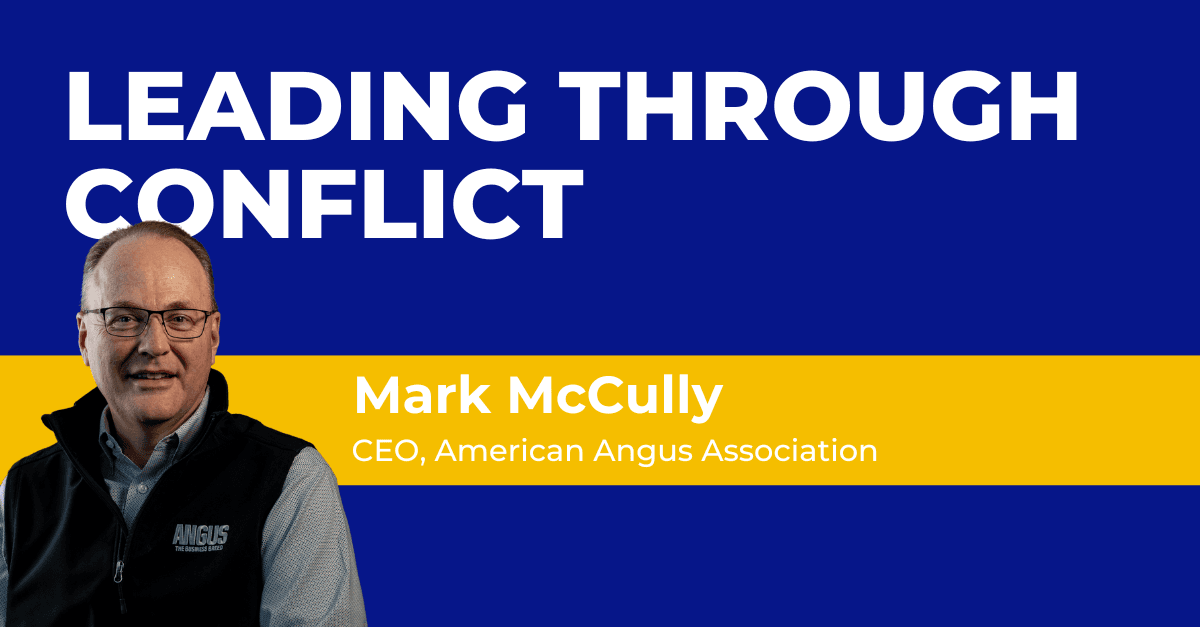
When the American Angus Association accepted a sustainability-focused research grant from the Bezos Earth Fund, the reaction across cattle country raised questions, conversations gained momentum online and Mark McCully’s phone rang more than usual. In moments like this, trust requires careful tending.
Mark suddenly found himself navigating a conversation that wasn’t just about a grant, but about challenging values and the future of an industry. Leading 22,000 paying members with deeply held beliefs meant listening, clarifying and communicating became more important than ever.
What followed was a masterclass in staying human when conversations get heated. The lesson is rooted in listening, clarity of intent and a refusal to dehumanize the people on the other side of the conflict.
Start with intent
“Whether you're leading a team of 3 or 300 or membership, you have folks that you know disagree to some level. I try to always focus the intent.”
Most conflicts are rooted in how we think we should get there, not what we want. Focus on aligning the team on the purpose first.
Make change: Before a tough discussion, ask “Can we agree on the goal we’re solving for?”
Listen past the emotion
“You have to truly listen to what people are trying to tell you.”
Listening sounds simple but it’s not. Real listening means separating emotion from information, especially in an industry where identity and legacy are on the line. Mark didn't dismiss the feelings that showed up in conflict. He honored them.
Practical Shift: When someone faces intense emotions, ask, “What’s at the heart of this for you.” People calm down when they feel heard.
Disagree and commit
“I try to avoid this idea of agree to disagree because when we agree to disagree, we're still debating. Can we disagree, but commit to this direction and commit to making this work?”
Agree-to-disagree just drags the debate into tomorrow. Leadership requires closure and action. Getting your team to disagree and commit allows for progress.
Ask yourself: “How can I align my team to the goal in front of us?”
Filter the criticism
“Don’t ever take criticism from someone you wouldn’t ask advice of.”
Not every critic is a coach. Not every comment is a command. Mark uses that filter to stay grounded.
Consider: Does this person understand the scope of the topic? Are they a stakeholder in this decision? What are their intentions with the criticism?
Humanize the conflict
“People are quite brave behind a keyboard.”
When tensions rise, Mark doesn’t fire back on social media. He picked up the phone because it was easier to align on the situation and understand their intent. Some of Mark’s harshest critics quickly shifted their dynamic when there was a name and voice associated with the situation.
Remember: Text and social media debates create distance. Voice and face bring people back to humanity.
What this really comes down to
Leadership isn’t about using influence to win arguments. It’s about pursuing purpose, cultivating change and fostering relationships.
If you want to lead people who care, expect conflict. Encourage it. And learn to host conversations that align intent and move the team forward.
Learn more
In the latest episode of The Cultivating Leaders Podcast, Mark gets real about managing conflict and rallying his team around the backlash.